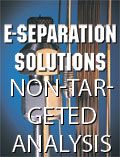Schug to Lead New Shimadzu Center at UT Arlington
Kevin Schug, an associate professor of chemistry and biochemistry at The University of Texas (UT) at Arlington, has been named the university's new Shimadzu Distinguished Professor of Analytical Chemistry.
Kevin Schug, an associate professor of chemistry and biochemistry at The University of Texas (UT) at Arlington, has been named the university’s new Shimadzu Distinguished Professor of Analytical Chemistry. He will also oversee a new Shimadzu Center for Advanced Analytical Chemistry, which has been established through an in-kind gift valued at nearly $3 million from Shimadzu Scientific Instruments (Columbia, Maryland).
Schug said the facility will provide many new capabilities that were not previously available. These, include enhanced capabilities for matrix-assisted laser desorption–ionization (MALDI), including ion trap–time-of-flight (IT–TOF), TOF-TOF, and high mass systems; proteomics and bioinformatics capabilities for use following liquid chromatography–mass spectrometry (LC–MS) and MALDI –MS analysis; polymer characterization by gel-permeation chromatography–MALDI with automated fractionation and spotting; MS surface imaging with chemical inkjet printer technology; and comprehensive metals analysis by inductively coupled plasma–optical emission spectroscopy (ICP–OES).
“In general, we have built a facility that can handle virtually any molecular analysis scenario,” said Schug.
Schug also noted that the central location of the Shimadzu Center would allow researchers in the UT College of Science and the College of Engineering to access the enhanced capabilities for trace qualitative and quantitative analysis. The facility also will be available for use by area businesses on a contract basis.
“UT Arlington has a dynamic science program focused on the future, and Shimadzu is pleased and eager to support such a research institution,” said Shuzo Maruyama, president of Shimadzu Scientific Instruments. “Kevin Schug is one of the leading young scientists in the country, and it will be a pleasure to work with him and the entire team at UT Arlington on future projects.”
The instruments, which are now up and running, will be used for research into the prevention and treatment of illnesses such as cancer and malaria, as well as in the development of nanofabrication materials for industry. Examples of some of the cutting-edge research that will be aided by the instruments available in the new center include:
• Research led by Schug using MALDI-TOF MS equipment to analyze cuticular lipids that can reveal age in a species of mosquito known for spreading malaria. Effective methods for analyzing mosquito age could help biochemical-based efforts to prevent spread of the disease, since younger mosquitoes are non-contagious. Schug will also use new metals analysis equipment in an ongoing study of private well water samples collected near natural gas sites.
• Subhrangsu Mandal, associate professor of chemistry and biochemistry, is currently looking for chemicals in the environment that could interfere with normal hormone functions and, possibly, fuel cancer growth. The MS equipment will help him better analyze test items such as commonly used growth hormones, water from various sources and milk. He received a 2010 grant of nearly $500,000 from the National Institutes of Health to fund his work.
• Jian Yang, associate professor of bioengineering, will use the new high performance liquid chromatography (HPLC) and MS equipment in his work on biodegradable fluorescent polymers. These polymers can help deliver chemotherapeutic agents to cancers and also enable sensitive cancer detection through optical imaging. Yang recently received a $1.25 million National Institutes of Health grant for this work.
Schug won the 2010 Eli Lilly Young Analytical Scientist Award, which recognizes a researcher doing work relevant to the pharmaceutical industry. He also is a member of the LCGC North America Editorial Advisory Board.
Removing Double-Stranded RNA Impurities Using Chromatography
April 8th 2025Researchers from Agency for Science, Technology and Research in Singapore recently published a review article exploring how chromatography can be used to remove double-stranded RNA impurities during mRNA therapeutics production.
The Effect of Time and Tide On PFAS Concentrations in Estuaries
April 8th 2025Oliver Jones and Navneet Singh from RMIT University, Melbourne, Australia discuss a recent study they conducted to investigate the relationship between tidal cycles and PFAS concentrations in estuarine systems, and offer practical advice on the sample preparation and LC–MS/MS techniques they used to achieve the best results.







